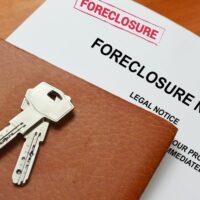How to Stop Foreclosure Through Bankruptcy

The risk of home foreclosure is one of the scariest parts of debt. Not only is losing your house devastating; it’s also likely to lead to more expenses like moving costs, rentals, furniture, and other items. Under the right circumstances, you can stop home foreclosure, even after it’s begun. Although it’s no one’s first choice, bankruptcy is one avenue for preventing home foreclosure. Read on to learn about how bankruptcy can help you stop your home from being foreclosed upon. If you are struggling with debt and would benefit from advice on how to protect your home and your finances, talk to a seasoned Ventura debt relief and bankruptcy attorney at Rounds & Sutter for advice and representation.
The Automatic Stay
Most individuals considering bankruptcy will file under Chapter 7 or Chapter 13. Regardless of whether you file for Chapter 7 or Chapter 13, or even Chapter 11, you can still benefit from the automatic stay.
When you and your attorney file for bankruptcy, the court will issue an automatic “stay” of all collection actions. All of your creditors must stop any collection actions, including lawsuits, foreclosures, repossessions, and even harassing phone calls until the stay is lifted. Even if the foreclosure auction/sale of your home has already been scheduled, it will be delayed by the stay. Creditors can ask the court to lift the stay with specific regard to their debt, such as if their debt will not be covered by the bankruptcy, but you’re given precious additional time to work with your lawyer and protect your treasured assets.
Will the Bankruptcy Stop or Just Delay Foreclosure?
The automatic stay will stop the foreclosure for the time being. Depending upon your circumstances, you can use your bankruptcy to stop the foreclosure entirely.
If you file for Chapter 13 bankruptcy, you, your attorney, your creditors, and the bankruptcy trustee will work together to set up a repayment plan. You’ll get additional time, up to five years, to pay off the debt you owe. Extending the time period lets you reduce your overall monthly obligation, allowing you to get current over the next 60 months. Your mortgage will be included in your repayment plan. So long as you keep up with your monthly obligation during the repayment period, you can avoid foreclosure.
Bankruptcy is also a good opportunity to review and remedy multiple mortgages. If you have multiple junior mortgages that are no longer fully secured by the value of the house, you might benefit from “lien stripping,” where the bankruptcy court strips away the junior mortgages and re-categorizes them as unsecured debts. Unsecured debts are lower priority and can be discharged at the end of your repayment period even if not fully repaid.
If you file under Chapter 7, stopping foreclosure is trickier. Exemptions like the homestead exemption might partially or completely protect your equity in the home, but your home might still be vulnerable depending on the home’s value, your equity, and what is left owing on the mortgage. Regardless, you’ll still benefit from the automatic stay and additional time to negotiate your mortgage. Work with your bankruptcy and debt relief attorney to determine if there’s a pathway to avoid liquidation of your house to repay your debts during Chapter 7.
Emergency Bankruptcy Petition
If your mortgage lender has already started the foreclosure process, you might need to file an emergency bankruptcy petition. An emergency bankruptcy lets you file for bankruptcy without filling out all of the documents necessary for a proper bankruptcy. Instead, you only need to fill out a couple of forms and enroll in a credit counseling course. You’ll still get the automatic stay, giving you time to get your affairs in order. You then have 14 days to file the rest of the bankruptcy forms and schedules, which vary depending on which chapter you’re filing.
If you’re facing imminent foreclosure, talk to a debt relief attorney ASAP to discuss the emergency bankruptcy petition and other options.
Find Financial Independence With Help From a Compassionate Southern California Bankruptcy and Debt Relief Attorney
If you are dealing with mounting debt and considering debt relief options including bankruptcy, please contact Rounds & Sutter for a free, confidential consultation. With offices in Ventura and Westlake Village, we represent clients throughout Southern California, offering trusted legal counsel in the face of life’s challenges.
